Twists and Turns in the Bowels of the Neon Dragon: A Dream Maze
BY Jackie Wang
Notes for national corpse month, continued:
Do dreams require belief? A system, like a machine with a dream at one end and belief at the other, each produced by the marvelous play of presences (Jackie Wang, below) manifested by the lights and mirrored bellows between? I ask this question in avoidance of another: How can we correspond with a corpse? One evening, I saw an old woman in black walking behind a coffin adorned with flowers. The coffin was being carried through the streets of a small island. The flowers looked like waterbirds with extravagantly twisted necks. The old woman did not look at the coffin. She kept her eyes on the ground. The sun was going down. She was in the coffin’s shadow. Watching this procession, I was overcome with a feeling: The coffin is empty: The funeral is for the old woman in the coffin’s shadow. There is, for example, Dead Christ in the Tomb (Holbein, 1522), in which the corpse appears subordinated (Dostoyevsky), self-seen, beyond resurrection, that is: no longer requiring belief. Because: the old woman was as if incarnating—the corpse’s open mouth, rolling eyes, pointed middle finger. The feeling was succeeded by another: The coffin is the void of the woman’s plea for correspondence with a corpse—her own. She will be forever behind it, forming its shadow, walking towards an unattainable union. Her steps were recounting, in the echoes of which sound the questions Jackie Wang asks in the wake of her dreams, towards recuperating bodies across distances in which might be recognized some form of lucid correspondence and/or dissolution. These questions, these dreams, are crucial—they take the form of writing alongside belief, to which I would add: that which is removed from the breath on the lid. Like extinguishing stars’ throwing light to dream better? Melancholia belongs in the celestial realm, writes Julia Kristeva. Meanwhile, I have spent most of this past month trying to absorb, without falling all the way through, the sun. That is another way of saying …
—Brandon Shimoda
***
Have you ever
in the space of a page
registered the shadow of what you could not say
and saying nothing, all you could say
was the gesture of turning away?
My circumlocutions went nowhere. While talking to my analyst I was unable to finish my sentences. I report to her, "I have not been in the right emotional space to write this essay. I don't feel it. This mood is not lyrical."
“It sounds like you haven't found your way in," she replies. But for weeks I've been collecting possible points of entry for this essay on corpses.
Can one write oneself toward the border one feels so far from?
I'm not living on the border. What I mean is: my connection to the other side has become weak. Without meaning to I've silently rejoined the community of the living. By that I mean I've haphazardly erected a fragile bridge over a black ocean.
I report to my psychoanalyst: “Yesterday, nothing moved.”
Would this essay have been easier to write if I were writing it a year ago, when I was still in the depths of a three-year depression? During those years my mind was full of corpses. When I looked into an empty sarcophagus at the Isabella Stewart Gardner Museum I saw myself, my corpse, resting in the marble coffin decorated with a scene of Bacchic revelry. The corpse I saw was not my body as it existed in that moment, but my corpse as a little girl—I had a feeling I had died long ago.
Do you ever feel that you were not meant to live through something, but the murder was incomplete, so you continue to live as a ghost of yourself?
Hélène Cixous: "It's as if they've botched beheading me."
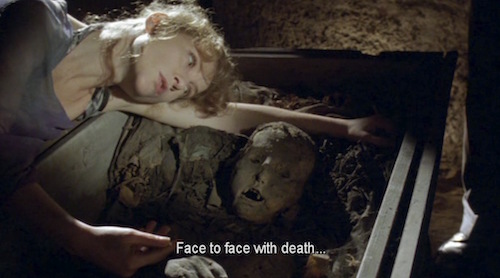
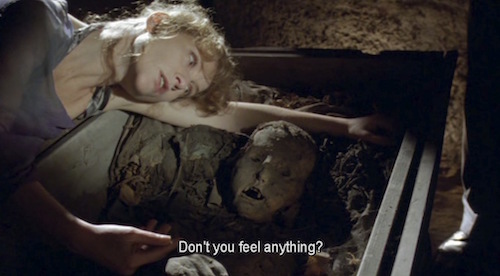
I wanted to write the brutal fact of absence, the corpse that does not signify, but also the impossibility of grasping this absence, which jams our thoughts when we attempt to cogitate death and sets into motion a marvelous play of presences that dance on (or around) the corpse-void. Observe, all this circling (the empty thing at the center). Dead people are phantom limbs. Maybe at one point I wanted to write about the ethics of calling lost ones into presence through a million emotional, mental and spiritual tricks, but now it seems to me that it is not a question of whether or not one should speak with the dead or can claim to have made contact with them. We do and we will. These conjurations seem to be a primal part of the human experience. What remains to be understood is how absence structures the present, and the conditions under which some are permitted temporary border crossings.
I'm not living on the border. I mean I'm no longer looking in the direction of the border, which I once felt as a temptation or beckoning. When the other side beckons I turn away. When I think I'm not on the border I'm still on the border. We're only ever one misstep away from becoming corpse. This, I hide. What is the nature of this truth, which I have consigned to secrecy? Once everything was weighed down by death, and it was almost impossible to move. I did a little trick. I said, "I'm not on the border," so movement would again become possible. That is why today I have to start with the structure of the maneuver that conceals the corpse and not the corpse itself.
*
A year ago, there was a dream I circled for a few sessions in psychoanalysis. At that time I only registered one death but there were three, three dead things, seen from three different angles: the event of death (the moment when someone passes over), the corpse, and the resurrected object. All I remember seeing was the corpse on its way to losing its shape.
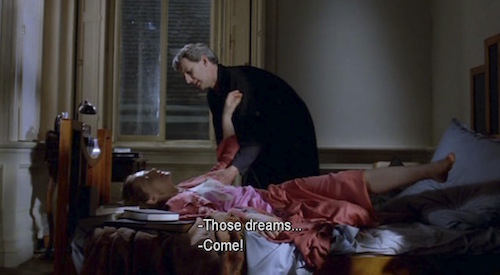
In the dream M. dies in my arms and seeing death makes me believe in God.
Death was everywhere. In grandma’s old house full of Italian baubles and knitted blankets…
A band played new wave covers as we slow-danced for death.
The brass band played in a circle with their horns pointed to the center.
In the dream the dead dog returns in another shaggier form and incapable of peeing outside.
The corpse has been liquefied. We try to leave it out for a week to slow dance around the plastic bag of soupy chop lover I mean liver.
But the plastic bag of liquefied corpse will not close.
The lingering death made me sad so I left to go investigate the educational cult.
I “drove” but it was not driving for my body was the car and I was moving on my stomach without getting burned by the pavement.
So euphoric, to glide through the night like this.
I said to myself, Driving isn’t so hard after all!
Then I happened upon the warehouse of the educational cult that had just been busted by the cops.
They told me to leave or they would kill me.
That’s when I saw M. Did I know he was about to die?
He was backing out of a driveway in a mini-corvette but he hit something and slammed his head against the windshield.
Yes I knew he was going to die before he died. I was so relieved that I got a few words with him.
He said, Tell X I love her. Then he joked, Will we still be able to have our fun conversations?
I said, Yes of course. When I’m dead too we’ll resume our fun conversations.
Right as he died a halo of light surrounded him.
When M died I thought, “I guess it ultimately didn’t matter that he was a smoker.”
Who will take care of the reincarnated dog?
*
The dream starts with the event of death—the death of friend, at the moment he passes over. This friend first drew me in with his death-drive nihilism. Once in the back of a cab in Brooklyn he told me it was a shame I didn't smoke because "every cigarette is a dance with death"—he was that kind of person. I used to have romantic feelings for this friend, but these feelings were aggressive and not tender; I wanted to reach some kind of limit experience by destroying or being destroyed by him. Nothing came of the crush but here he is in my dream, still repping death though this time not as its spokesperson, but through the act of dying itself. So he dies. And after witnessing the proverbial flame go out I undergo a religious conversion. Why his death made me a believer, I do not remember. Was it a need for eternality in the face of a finitude I could not accept?
But the dream didn’t start with M’s death. In started in the House of Death, surrounded by grandma’s Italian baubles and knitted blankets. Her liquefied corpse was in a plastic bag on an altar in the center of the room, and this fleshsack magnetized my attention. No matter what was happening all around me I was hyper-conscious of a certain threat, that the plastic bag would topple and spill the contents of my grandmother. So for a week I stood at the altar trying to prevent the corpse from leaking out of the bag while relatives milled about around me, publicly (and perfunctorily) performing their grief. From time to time the fleshsack would sort of wobble as though sentient and I would rush to catch the bag, saving liquid grandma from further disintegration. It was my duty. I kept trying to position the bag such that it would stand upright and not fall over, but both the bag and its contents were formless, my attempts to stabilize the situation were futile. I had to stand watch for the duration of the wake, but my attention was divided. Why was I the only one paying attention? Did no one else care to prevent the splatter of grandma? I hated the indifference of my relatives and their irreverent attitude toward my grandma’s corpse.
I don’t remember the brass band that played new wave covers. I remember the dog, which was a reincarnation of my childhood dog. When the reincarnated dog arrived on the scene the task of containing grandma became more challenging. This dog, which did not resemble my childhood dog at all but indeed was the essence of the deceased dog, was not potty trained and so he pissed and shit on everything. But no one paid any attention to the leaky dog; it was on me to manage both the dog and grandma’s liquefied corpse. How could I contain both? My task was impossible. There would soon be a huge mess on our hands, one that, no doubt, I would have to tend to. Bodily fluids would cover the House of Mourning. Everything about the situation fatigued me, especially my relatives, so I left.
I remember almost nothing about the educational cult, except the conspiratorial atmosphere of the warehouse and a looming sense of danger. In fleeing the House of Death I was trying to escape a duty I could not fulfill, but instead I became an accidental witness to a criminal operation. I knew something, and this knowledge meant I would henceforth be a hunted woman.
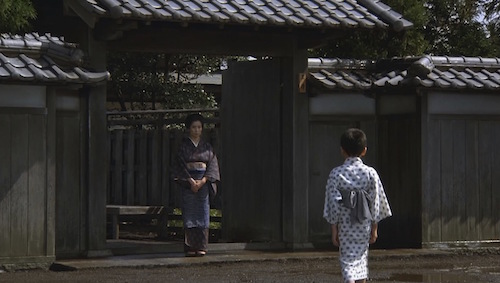
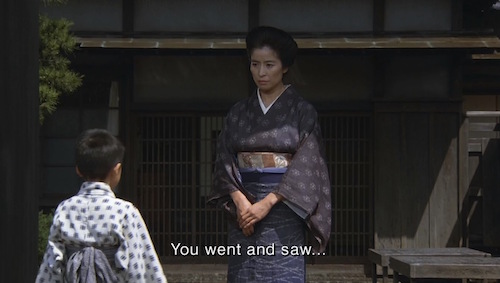
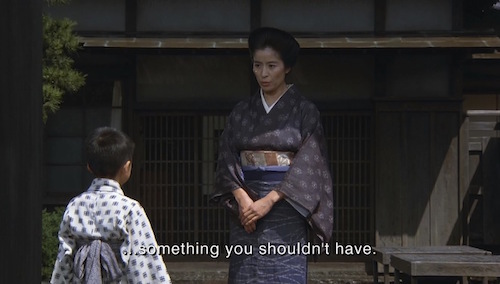
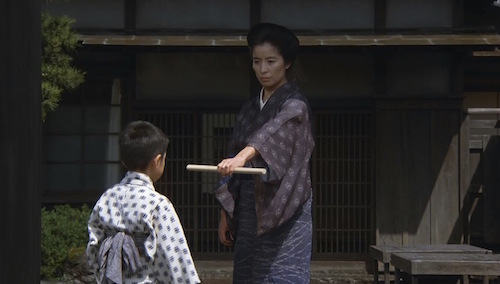
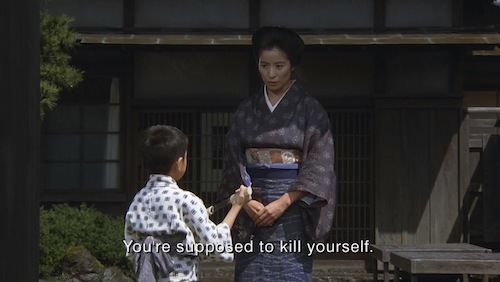
M and I tried to escape in the mini-corvette, but I knew he would die. How? Because I was the dreamer? Did I need him to die? I experienced his death as the consummation of a love that had been denied me, because what is more intimate than witnessing someone’s death? Still, duty governs me. As an accidental death shepherd it is my task to comfort the dying friend, to facilitate the transition—in a sense, to soften this abrupt death. In real life M and I would always have very stimulating conversations about philosophy, politics, relationships, etc. We would spend hours walking around New York, rubbing our brains together. Did I believe we would continue our conversations, or was I just telling him what I thought would bring him the most peace of mind? Did I need to believe that as an interlocutor I was somehow more than a lover?
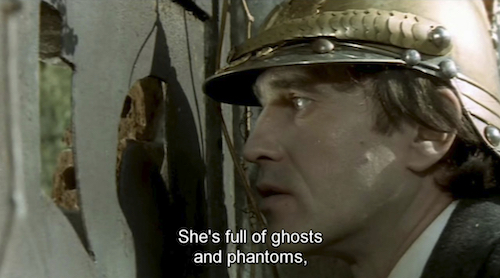
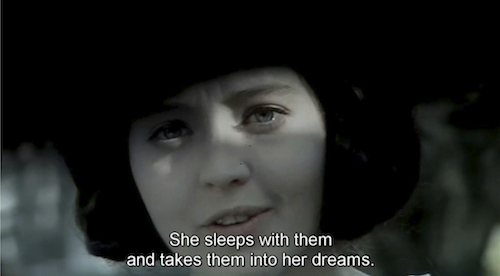
In Peplophoros as the World with Her Head Lopped Off I document another dream of my grandma’s corpse.
The morning of my grandma’s wake I dream her corpse comes flattened and cut into three pieces: the head, the chest, and the body below the waist.
You can see cross sections of her body where the cuts were made. Like Damien Hirst animals. Layers of flesh, a specimen.
Grandma’s body becomes an ice cream cake.
Her face is not her face but a face sculpted out of whip cream and icing, with maraschino cherries for eyes and a creepy painted clownish smile.
A week later. What did I see? I was at IHOP with Leah, Brandon, and Ryan after psychoanalysis. When I looked at the IHOP menu I saw a frosted smiling pancake in the kid’s section: the face of my grandmother’s corpse. The cake corpse I dreamed right before seeing the corpse-corpse. I think I nonchalantly said, This smiling pancake has the exact same face of my grandma’s corpse when it appeared to me as cake. Quickly, I changed the subject, not wanting to be so macabre before people even had a chance to consume their morning coffee.

The fantasy of melancholy cannibalism, according to Julia Kristeva in Black Sun: Depression and Melancholia, is a way to maintain an attachment to the lost object in the face of death. The body of the other is literally consumed in many of the dreams of depressed persons:
Better fragmented, torn, cut up, swallowed, digested…than lost. The melancholy cannibalistic imagination is a repudiation of the loss’s reality and of death as well. It manifests the anguish of losing the other through the survival of the self, surely a deserted self but not separated from what still and ever nourishes it and becomes transformed into the self—which also resuscitates—through such a devouring.
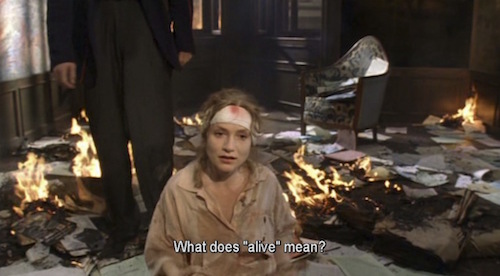
June 17, 2015
The city is alive tonight but I am in bed trying to wind down so I can wake up early tomorrow and prepare for my reading. So many things to do tomorrow—Derek is going to introduce me to new people. I have to stop by an art exhibition I am in to see the exhibit, pick up a check and copies of my chapbook PEPLOPHOROS AS THE WORLD WITH HER HEAD LOPPED OFF, which I wrote in March around the death of my grandmother after dreaming her corpse came to me as an ice cream cake with a pancake head and whip cream death smile. In The Hourglass Sanatorium I kept crying every time there was a corpse because I was dreaming of the corpse in so many forms: food, a plastic bag of liquefied flesh. Two nights ago I dreamed of a row of corpses in ostentatiously decorated open mini-caskets that small people slept on as a kind of grieving ritual. I wanted to ask, Why? Why this parade of death? There was a painting of Jesus in a swirl of color rendered roughly, like it was made by a child. The next day the poet Brandon Shimoda sent me a random message that said the corpse is saying fuck you. Maybe if you met me at another time you would have overlooked me because I wouldn't have been leaving the Harvard Film Archive in a dazed state of extreme emotional agitation. How did I start talking about this when I was just trying to list what I will do tomorrow? See different groups of people. Gallery. The big reading. Radio show appearance. Then I will fly to Detroit and my tree brain will forget these dreams of corpses and the bowels of the glowing dragon and the field where the distant poetry professor appears suddenly full of love and dying to profess that all this time he has wanted to tell me that I am someone truly special, and with this love that suddenly completes me I can travel to a land very far north and produce beautiful Bjork music videos full of gold sparkles that sway in water. Everywhere I go there is so much love waiting for me yet why do I wake up from these dreams feeling loveless? Bereft. Could anything ever possibly repair this deep feeling of motherlessness? My friend Hannah Black always used to joke that I was raised by the universe. What does that mean?
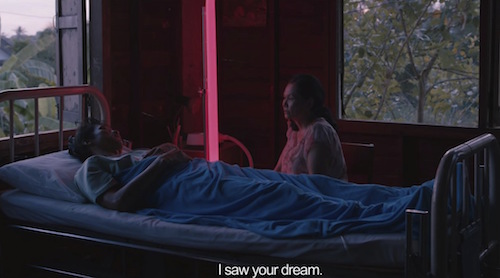
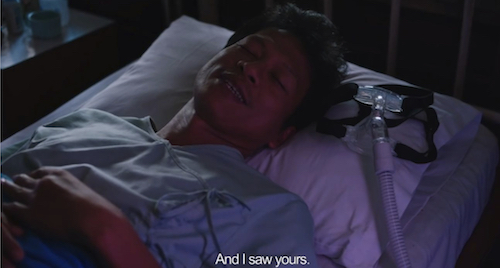
In the dream there was a Korean spa with a dirty tub and a hero's journey through the guts of a glowing dragon.
Did you see the face? No, I didn't see the neon face glowing in darkness.
We saw the seams of the performance. What was behind the curtain…
It was all commerce. The amusement park spa ended with the desperate woman trying to sell me jewelry.
I remember all the rings and earrings. She knew I wanted a glam butterfly ring but it was too small and heavy.
Bling butterfly…
Cheap jewelry from China. Earrings made of fake fingernails.
Then there was a performance behind the curtain. Did we miss part of the show?
Was everyone performing death?
We left through the back door
Past a lonely piano in the secret chamber…
In the alley behind the spa were grieving people lying on extravagantly decorated mini-caskets.
How had so many died at once?
I asked about the death ritual because it was unique.
The dead bodies were visible. It could have been a stationary parade of death, crucifix in a swirl of colors.
But how was everyone so small?
Why was it important for me to distinguish between commerce and authentic ritual?
The spa cost $68.
Why was it so hard for me to disappoint the capitalist? She guilted me.
The ritual of commerce…
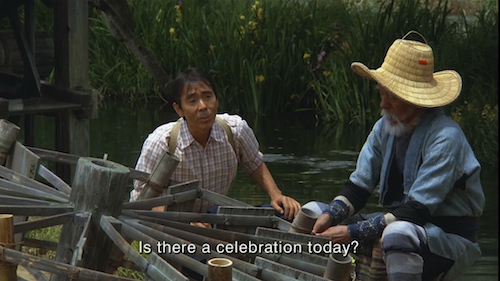
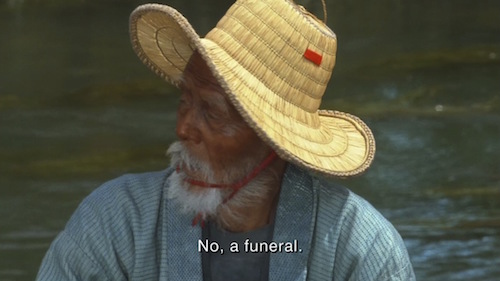
I slept only a couple hours, if that, and dreamed a little boy was exposed on a table and I climbed on top of the table to cover and protect the boy with my body. I was confident that I could soothe him and lived only to soothe the exposed child. In the distance was his mother, who was trying to transmit messages to him with her facial expressions. Did the boy want to go back to his mother or stay? The mother was staring at me. We were in the middle of a poetry war. L was trying to recite an Audre Lorde poem and forgot the words on stage, and then A tried to upstage her by reciting the poem from the audience while gesticulating wildly. The war was between the white and non-white poets. I did not participate in the poetry competition because I was too tired, so I stayed near the child. Everyone was reading a zine of my work, which was assembled by one of my fans (in my dreams it is always others who “assemble” my work, for I have no motivation to do it myself). I was not who they thought I was. I made a joke. I was not in the mood to make a joke but I made it to make everyone else feel at ease. It made me feel terrible.
When I woke up I was very confused. Didn't want to get out of bed. Everything seemed wrong. Wrong wrong wrong. Then the attack. I won't say anything else about it. I looked out of the window at the rain. It's too much effort to turn a light on. I take a long bath when everyone has left for work. Masturbate. It's later than I think, so I have to rush out of the house. Tried to take a bus to the house of the woman who gave me a ride to Chicago to pick up Cixous's Dream, I Tell You, which I left in her van. Run to the bus in the rain. Get on the bus. Realize I'm going the wrong way on the bus. The bus driver gets angry that I got on the bus and then immediately get off. I stand in the rain while waiting to get the bus going the other direction, but the bus never comes. I can't wait any longer because I have to meet Lauren Berlant, so I walk a mile in the rain to the train. Before meeting Lauren I go to the bathroom and look into the mirror. My eyes are bloodshot (from crying?)—little red demon marbles to match my red lipstick. And I am completely wet. We sit through an artist talk by Wu Tsang. After the talk she says, Do you want to eat at Russian Tea Time? Oh yes, I might go to Russia one day, I should learn how to drink the tea. At dinner—cried into my vegetarian sampler. Before we parted she said she wished she could give me something to carry, a keepsake or stone or talisman that would make me feel safe in the world.
When I got back to the house Ben and Holly were playing and singing labor union songs. I made Ben play all my favorite Great Tap Root songs for me on a banjo. Everyone sang and rolled around on the floor together like we did when we all lived in Baltimore. I kept making Ben play his song based on the William Blake poem “Infant Sorrow”:
My mother groan'd! my father wept.
Into the dangerous world I leapt.
Helpless, naked, piping loud;
Like a fiend hid in a cloud.
Struggling in my father's hands,
Striving against my swaddling bands;
Bound and weary I thought best
To sulk upon my mother's breast.
When Lauren says "protection," the word ricochets off my morning dream and is shot through the Blake poem. It is an infant feeling. You get lost in it. How can I live, so lost in it, but then I ask myself, what can anyone know about life without knowing the extremes of joy and death, without experiencing that moment when emotional anguish becomes so unbearable that the Self detaches from Being and you find yourself at the center of the mystery, in the middle of the night, staring out the bathroom window of a crumbling Detroit house listening to the breeze gently blow some wind chimes while everyone sleeps. Why did I think, I will hear that twinkle at the moment of my death, whether or not it is objectively there—it’s the Breath of God. I don't know how the nighttime wind chimes could produce absolute knowledge of death, or why, in that moment, the truth of death is felt as the ultimate peace. I dread the moment the Self floats down from the sky and re-inhabits my body.
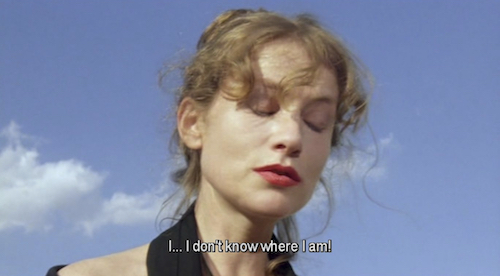
On the outer edges of subjective experience—“It’s lonely out here.” I walk through the Ukrainian forest in the dark. And on the other side: an unbearable light. The fear, the fear, the beheading—then, grace. Suddenly the luminous world emerges from behind the veil of darkness.
INTO THE FOREST, WHERE LOST THINGS GO
What didn’t I see the first time I watched the film The Shadow of Forgotten Ancestors? Ivan is dying, stumbling through the razed forest, which is still on fire. He looks into the river. He is bleeding into the water and the dead Marichka appears. She taps the water. His blood disappears. He looks up and the forest is whole again. But now the song of Marichka is echoing all around him. Where is Marichka? Has Ivan lost his mind in the birch and poplar trees? “I shall sing to you so that you won’t understand.” What is the song or chant that accompanies this passage?
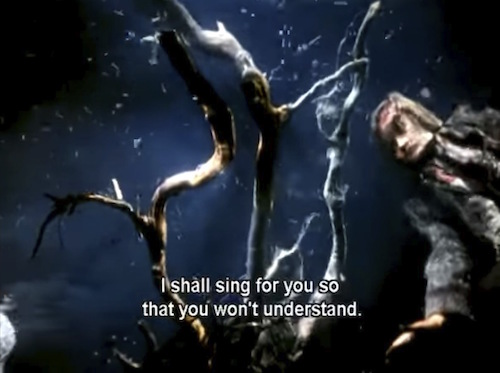
I remember what Édouard Glissant said about borders, how he likes borders because he likes the way the atmosphere changes when crossing a border. He said that borders should be about marking a passage—a change in air—and not about keeping people in or out.
What is the world between worlds, when Marichka returns, and the forest is restored, and the song is suddenly everywhere, the forest is singing the lover’s song to the lovers as they stare at each other, confused about what is happening. Ivan wants to know: Am I dead? Is this the grim reaper’s siren song, summoning me to the other side?
What changes when she taps the water: it is a border crossing.
The sound changes
and Ivan is reborn in the forest.
“And when we parted the lilacs withered.”
Nothing grows in a world without Marichka.
On the edge of death: the return of love lost. When you are about to die you meet the ones who are already dead. They facilitate the passage. One touch and you turn to silver, which is cinema’s way of saying: corpse.
A week ago Dylan called me in the morning, 8 a.m. his time. What could it be? He had just woken up from a dream in which he was visited by a dead friend, and something about the visitation made death seem softer, more peaceful. “If anything happens to me, Gui Gui, you know…”
I want to say that every dream is a little death…a visit to the liminal space, where it is always raining silver in the forest.
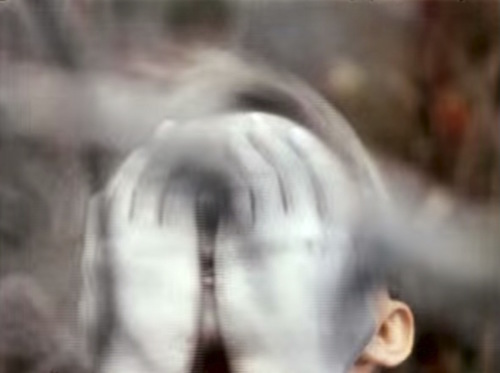
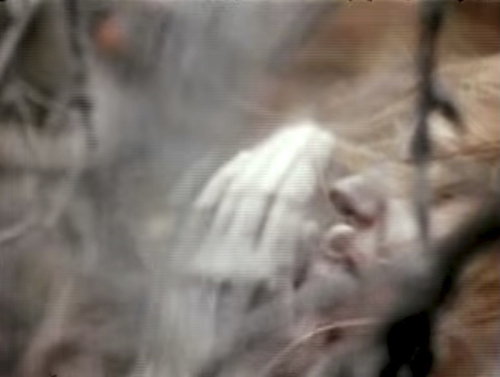
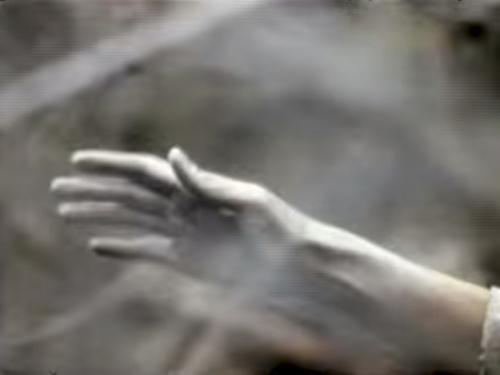
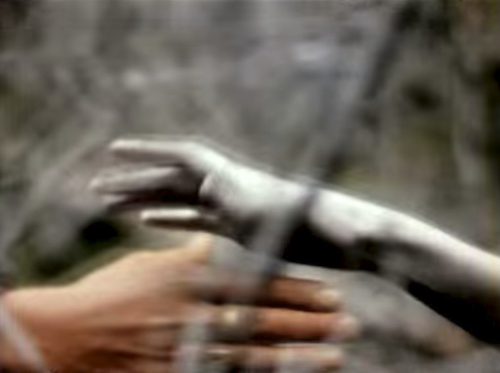
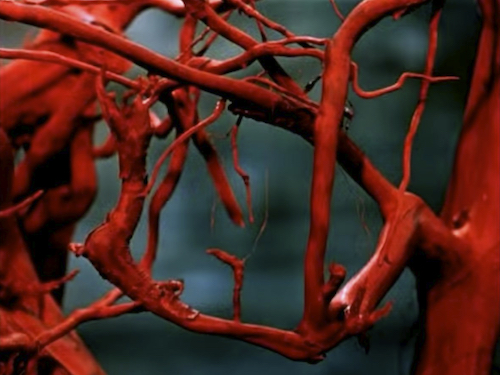
[Author's Note: Film stills from Werner Schroeter's Malina, Wojciech J. Has's Hourglass Sanitorium, Akira Kurosawa's Dreams, Apichatpong Weerasethakul’s Cemetery of Splendour, and Sergei Parajanov's Shadows of Forgotten Ancestors]
***
[Guest Editor’s note: Notes for national corpse month is the title of/refers back to the essays I wrote last year for Harriet, also for the occasion of National Poetry Month (2015). Re/visit Parts One, Two, Three, Four, and Five. See also: Yanara Friedland’s "Unknown," Caitie Moore’s "Corpse and Slur," Youna Kwak’s "This having been earthly seems lasting," and Dot Devota’s "Race Riot At East St. Louis July 2, 1917"]
Jackie Wang is a queer poet, essayist, filmmaker, performer, alien, and prison abolitionist. She lives…
Read Full Biography

